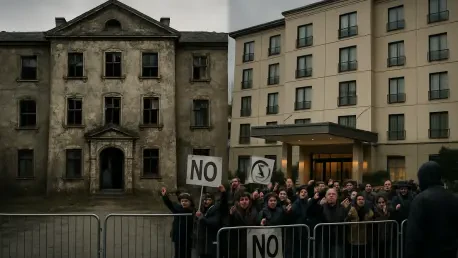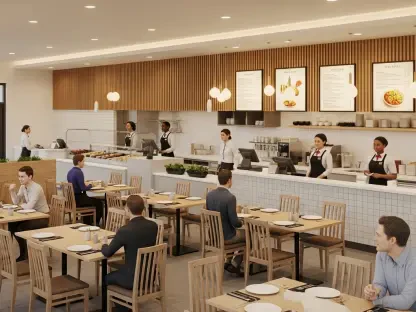In a quiet corner of North Somerset, England, a seemingly unremarkable hotel has ignited a firestorm of political debate and public scrutiny, drawing attention to the complex issue of asylum seeker accommodation in the UK. Winford Manor Hotel, nestled in the small village of Winford, has been repurposed to house asylum seekers, a decision that has sparked controversy, especially due to the involvement of former Conservative MP Jacob Rees-Mogg. Known for his outspoken views, Rees-Mogg recently highlighted the hotel’s use on his television program, expressing surprise and skepticism about its suitability and location. Yet, a deeper look reveals that this arrangement was made under the very government in which he held senior positions, raising questions about consistency in his public stance. This situation not only underscores the broader challenges of managing asylum policies but also highlights the tension between political rhetoric and past governmental actions, setting the stage for a nuanced discussion on accountability and transparency.
Unveiling the Winford Manor Controversy
The saga of Winford Manor Hotel began when it was commissioned by the Home Office to accommodate asylum seekers in late 2022, a time when the UK grappled with rising numbers of individuals seeking refuge and limited housing options. This decision, while practical for authorities needing immediate solutions, placed the hotel in a remote area far from urban centers, prompting concerns about accessibility to essential services for its occupants. On a recent broadcast, Jacob Rees-Mogg delved into the issue, filming at the location and questioning why such a secluded spot was chosen, even hinting at the possibility of it being an undisclosed arrangement for migrants. His tone suggested a lack of prior knowledge or approval, painting the situation as an oddity in government planning. However, this portrayal stands in stark contrast to the timeline of events, as the policy was enacted during his tenure in significant cabinet roles under two Conservative administrations, casting doubt on whether his current critique aligns with his past responsibilities in shaping or overseeing such decisions.
Public reaction to the hotel’s use has been a mixed bag, reflecting the broader national discourse on asylum seeker accommodations. In Winford, a village unaccustomed to such arrangements, initial concerns surfaced when the plan was announced, with dozens of residents attending forums to voice unease about safety and resource allocation. Parish council records indicate efforts to mediate between locals and authorities, seeking clarity on the hotel’s status even two years after the initial setup. While some villagers near the property have expressed ongoing worries about potential disruptions, others have noted little to no impact on daily life. Police data from Avon and Somerset further complicates the narrative, showing no specific crimes linked directly to the hotel’s occupants in recent months, though a handful of public order incidents were recorded at the site. This suggests that while apprehension exists, it may not always be rooted in tangible problems, highlighting the often emotional nature of debates surrounding asylum policies in rural communities.
Political Accountability Under Scrutiny
Delving into Jacob Rees-Mogg’s role during the period when Winford Manor was designated for asylum seekers reveals a potential disconnect between his past actions and present commentary. Serving as a cabinet minister under Boris Johnson and later Liz Truss, he was part of the administration that endorsed the use of hotels as temporary shelters amid a backlog of asylum claims. His positions, which included responsibilities for government efficiency and later business and energy strategy, placed him at the heart of policy discussions, even if not directly overseeing migration. Critics argue that his recent televised skepticism—where he described the hotel’s location as obscure and questioned its purpose—appears inconsistent with the decisions made under his government’s watch. This raises broader questions about how much awareness or influence senior politicians have over departmental actions and whether public critique after leaving office reflects genuine concern or strategic posturing in a highly polarized debate.
The political landscape surrounding asylum accommodations continues to evolve, with the current Labour government under Keir Starmer pledging to phase out the use of hotels for such purposes by the end of the current parliamentary term. This commitment signals a potential shift in approach, addressing longstanding criticisms about cost, community impact, and the suitability of such venues for vulnerable populations. For Winford, this could mean a return to normalcy for the hotel, though timelines remain uncertain. Meanwhile, the situation with Rees-Mogg exemplifies a recurring theme in politics: the challenge of reconciling past governmental roles with current public narratives. His comments have fueled discussions on whether politicians should be held accountable for policies enacted during their tenure, especially when they later position themselves as outsiders critiquing those same systems. This tension underscores the need for transparency in how decisions are made and communicated, particularly on issues as sensitive as asylum seeker support.
Reflecting on Policy and Public Trust
Looking back, the controversy over Winford Manor Hotel serves as a microcosm of the UK’s struggle to balance humanitarian obligations with local concerns. The decision to house asylum seekers in a remote location, while pragmatic at the time, stirred unease among some residents and drew sharp commentary from figures like Jacob Rees-Mogg, whose involvement in the responsible government added layers of complexity to the narrative. Police records indicating minimal disruption contrast with emotional public responses, revealing a gap between perception and reality that often defines such debates. The political backdrop, marked by Rees-Mogg’s apparent shift from insider to critic, highlights enduring questions about accountability that linger long after the initial decision was made.
Moving forward, the path to resolving tensions around asylum accommodations lies in clearer communication and more sustainable strategies. The Labour government’s promise to end hotel use offers a potential turning point, but implementing alternative solutions will require addressing both logistical challenges and community apprehensions. For rural areas like Winford, involving locals in planning processes could bridge divides, while national leaders must prioritize consistent messaging over retrospective criticism. This episode serves as a reminder that effective policy hinges on aligning immediate needs with long-term trust, ensuring that decisions made today withstand scrutiny tomorrow.









